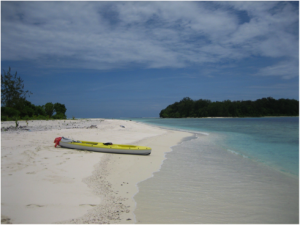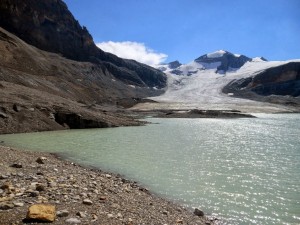Last year I took Simon’s Faculty of Arts course “Climate Change: Science and Society.” Throughout the course, he emphasized the end goal: not to create climate scientists, but for each student to be able to explain to a family member or friend about what climate change is, and why it might be relevant to his or her life. So, throughout the course, I found myself wondering, how exactly I would talk about climate change in such a scenario. This past summer, I worked in the Canadian Rockies as a naturalist, and I was forced to ask this question in a very real way. My approach: don a sequined blue dress to investigate climate change in alpine environments.
Author Archives: Meghan Beamish
Fieldwork in Solomon Islands
by Sophie Webber (UBC Geography)
I just returned from five weeks of dissertation fieldwork in Solomon Isla nds. My friends and family are always jealous of my research trips, thinking they look something like this photo.
nds. My friends and family are always jealous of my research trips, thinking they look something like this photo.
Of course it does; Solomon Islands has wonderful snorkeling and beaches. But I spent my time in Honiara the capital, interviewing Solomon Islands Government officials and representatives of development partners including bilateral donors, regional organizations, and large, international non-governmental organizations.
I was interviewing these personnel with a couple of objectives. First, I am interested in understanding the differences – in theory, and in practice – between putative Development interventions, and Adaptation ones. I am trying to understand why it matters to certain development actors whether a project is called climate change adaptation, or, say, an education investment. And second, I asked questions about how these climate change adaptation, resilience, and risk management programs incorporated scientific information – including projections, scenarios, and short-term forecasts. In particular, I am trying to figure out how uncertainty around precise future climate change impacts are worked around and incorporated.
Welcome to the new Maribo!
In 2006, a naïve young climate scientist realized he had become a climatic Kevin Bacon to friends and family. None of them studied or worked in the areas of physical science, environmental science or environmental issues. Yet they were all interested in news about climate change simply because there was one person in their community who studied climate change for a living. Maribo was his attempt to engage and expand that community.
The new edition aims to continue that open conversation about climate and global change, but with a few more hands on deck.
We hope to bring science, stories and perspective that you won’t hear somewhere else. In addition to the regular posts, there will be interviews with experts on new research, dispatches from the field, and stories from students and other young scientists.
Stay tuned.

